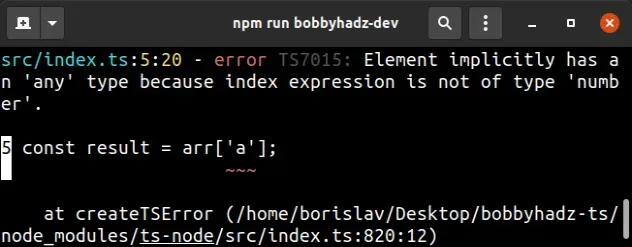目录
Element implicitly has an ‘any’ type because expression of type ‘string’ can’t be used to index type
index,请单击第二个副标题。元素隐式具有“any”类型,因为类型“string”的表达式不能用于索引类型
string当我们使用a 索引具有特定键的对象时,会出现错误“Element implicitly has an ‘any’ type because expression of type ‘string’ can’t be used to index type”。
要解决该错误,请键入string作为对象键之一的。
下面是错误如何发生的示例。
const str = 'name' as string; const obj = { name: 'Bobby Hadz', country: 'Chile', }; // ⛔️ Error: Element implicitly has an 'any' type // because expression of type 'string' can't be used // to index type '{ name: string; }'. // No index signature with a parameter of type 'string' // was found on type '{ name: string; }'.ts(7053) obj[str];
变量str有一个类型string,这可以是任何string。
name当我们尝试访问具有 a和
属性的对象时出现错误country。
TypeScript 告诉我们类型string太宽泛,并非所有字符串都是对象中的键,因此我们必须确保
特定字符串是对象的键之一。
使用类型断言解决错误
解决错误的第一种方法是使用
类型断言。
const str = 'name' as string; const obj = { name: 'Bobby Hadz', country: 'Chile', }; // 👇️ "Bobby Hadz" console.log(obj[str as keyof typeof obj]); // 👇️ type T = "name" | "country" type T = keyof typeof obj;
我们使用类型断言向 TypeScript 表明该str变量是一个
仅包含对象键的联合类型。
现在 TypeScript 允许我们在不抛出错误的情况下访问特定的属性。
我们使用keyof typeof来获取对象键的联合类型。
如果您直接使用类型,则只需使用keyof MyType获取对象键的联合。
const str = 'name' as string; interface Person { name: string; country: string; } const obj: Person = { name: 'Bobby Hadz', country: 'Chile', }; console.log(obj[str as keyof Person]); // 👉️ "Bobby Hadz" // 👇️ type T = "name" | "country" type T = keyof Person;
keyof Personand not因为它是一个类型而不是一个对象。 keyof typeof PersonPerson输入变量来解决错误
解决这个问题的更好方法是键入变量,str以
keyof Person向 TypeScript 表明它string永远只是对象的键之一。
interface Person { name: string; country: string; } // 👇️ this will only ever be one of object's keys const str: keyof Person = 'name'; const obj: Person = { name: 'Bobby Hadz', country: 'Chile', }; console.log(obj[str]); // 👉️ "Bobby Hadz"
现在我们不必在代码中使用类型断言。
当我们有关于 TypeScript 不知道的值类型的信息时,使用类型断言。
X将是类型的X,不用担心它。如果我们错了,这可能会导致运行时错误。这是另一个示例,说明如何将值键入为对象的键之一。
interface Person { name: string; country: string; } const obj1: Person = { name: 'Bobby Hadz', country: 'Chile', }; interface AccessPerson { keyName: keyof Person; // 👈️ only one of Person's keys } const obj2: AccessPerson = { keyName: 'country', }; console.log(obj1[obj2.keyName]); // 👉️ "Chile"
我们正在使用该obj2.keyName属性访问obj1.
为了能够做到这一点,我们必须将keyName属性输入obj2为 type keyof Person。
keyName中的属性只能obj2有nameor
的值country,因此 TypeScript 允许我们安全地访问 中的属性obj1。
这是对错误的最类型安全的解决方案,因为如果我们试图将 的值更改obj2.keyName为不兼容的类型,就会出现错误。
interface Person { name: string; country: string; } interface AccessPerson { keyName: keyof Person; } const obj2: AccessPerson = { keyName: 'country', }; // ⛔️ Error: Type '"hello"' is not // assignable to type 'keyof Person'.ts(2322) obj2.keyName = 'hello';
尝试设置obj2.keyName为name或以外的任何其他值country会导致错误。
当函数参数的隐式类型为
any.
元素隐式具有 ‘any’ 类型,因为索引表达式不是 ‘number’ 类型
当使用非数字值对数组进行索引时,会出现错误“元素隐式具有‘任何’类型,因为索引表达式不是‘数字’类型”。
要解决该错误,如果存储键值对或使用类型断言,请使用对象。

以下是错误发生方式的 2 个示例。
const arr = ['a', 'b', 'c']; // ⛔️ Error: Element implicitly has an 'any' type // because index expression is not of type 'number'.ts(7015) const result = arr['a']; // -------------------------------------------------- const obj: { [key: number]: string } = { 0: 'a', 1: 'b', }; // ⛔️ Error: Element implicitly has an 'any' type because // index expression is not of type 'number'.ts(7015) const result2 = obj['a'];
在第一个示例中,我们尝试使用字符串访问索引处的数组元素。
访问索引处的数组
如果您尝试访问索引处的数组元素,请使用从零开始的数字。
const arr = ['a', 'b', 'c']; const result = arr[0]; console.log(result); // 👉️ "a"
如果用于索引数组或对象的值的类型不正确,请使用类型断言。
const arr = ['a', 'b', 'c']; const result = arr['1' as unknown as number]; console.log(result); // 👉️ "b"
当我们有关于 TypeScript 不知道的值类型的信息时,使用类型断言。
我们有效地告诉 TypeScript 该值是类型的number,不用担心它。
抑制整个项目的错误
如果您想抑制any整个项目的隐式索引错误,您可以在tsconfig.json
文件中执行此操作。
{ "compilerOptions": { "suppressImplicitAnyIndexErrors": true, // ... rest } }
当
suppressImplicitAnyIndexErrors
选项设置为 时true,any在对对象或数组进行索引时不会报告隐式错误。
使用带有索引签名的对象来存储键值对
如果您尝试存储键值对,请使用具有索引签名和字符串键的对象。
type Person = { [key: string]: any; }; const obj: Person = { name: 'Bobby Hadz', }; obj.age = 30; obj.salary = 100; obj.tasks = ['develop', 'test']; console.log(obj['age']); // 👉️ 30 console.log(obj['salary']); // 👉️ 100
该{[key: string]: any}语法是
TypeScript 中的索引签名,当我们事先不知道类型属性的所有名称和值的形状时使用。
string,它将返回一个any类型的值。您还可以显式添加您事先知道的属性名称和类型。
type Person = { [key: string]: any; name: string; // 👈️ add name property of type string country: string; // 👈️ add country property of type string }; const obj: Person = { name: 'Bobby Hadz', country: 'Germany', }; obj.age = 30; obj.salary = 100; obj.tasks = ['develop', 'test']; console.log(obj['age']); // 👉️ 30 console.log(obj['salary']); // 👉️ 100
我们显式键入了name和country属性。这为指定的属性提供了更好的类型安全性和 IDE 自动完成功能。
额外资源
您可以通过查看以下教程来了解有关相关主题的更多信息:
